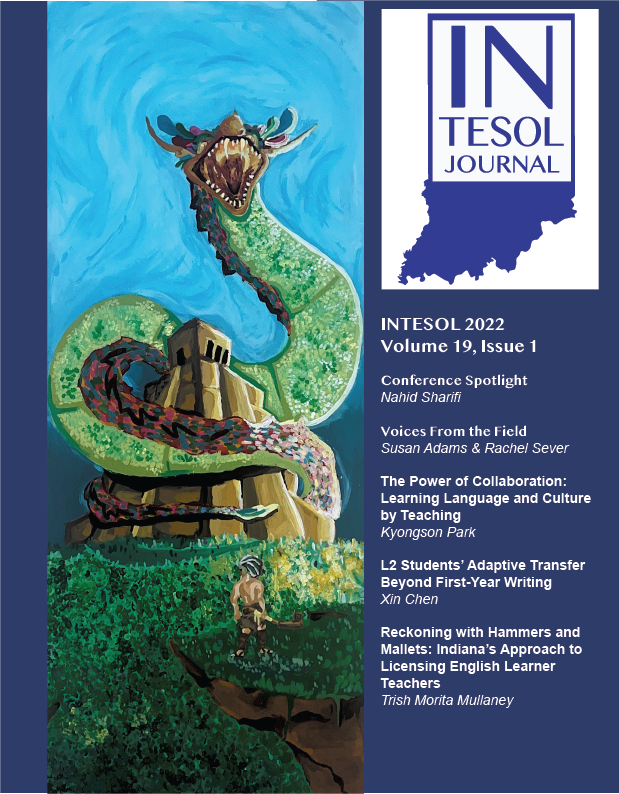Reckoning with Hammers and Mallets: Indiana’s Approach to Licensing English Learner Teachers
DOI:
https://doi.org/10.18060/26562Keywords:
language policy, Indiana, language management, educational policy, English learners, bilingual education, English Learner licensureAbstract
INTESOL has actively advocated for appropriate certification and training of Indiana’s EL teacher workforce, informing the policy of the Indiana English Learner (EL) Teacher of Record. The Indiana EL Teacher of Record requirement, established in 2019 by the Indiana Department of Education asserts that by 2022, all Indiana school districts will have an established 30:1 ratio of EL students to EL-licensed teachers meeting the minimum criterion of two Supreme Court cases, Lau v. Nichols (1974) and Castañeda v. Pickard (1984). The Indiana Department of Education, the funder of this policy, granted accredited universities in EL education to train and license educators, increasing the overall capacity of districts to meet the needs and rights of their ELs with appropriate staffing and programming. While efforts to meet 30:1 goal are still in progress, Indiana’s approach has contrasted with other states who addressed such licensure initiatives with a heavy hammer, whereas Indiana has done it with a softer mallet. Implications for universities, districts, and families are discussed.
References
Albrecht, D., & Morita-Mullaney, T. (2018). English Learners’ Success, IDOE Priorities and Educator Preparation. Indiana Association of School Superintendents.
Appleton, A. (2022a). 3 takeaways from Indiana lawmakers’ hearing on funding for English learners, kids in poverty. Chalkbeat. https://in.chalkbeat.org/2022/10/18/23411751/indiana-school-funding-students-poverty-english-learners-committee-session-2023
Appleton, A. (2022b). Some Indiana schools may be failing to meet staffing rules for English
learner students. Chalkbeat. https://in.chalkbeat.org/2022/11/3/23437484/indiana-english-learner-students-teachers-staffing-shortage-federal-requirementAspira of New York, Inc. v. Board of Education, 394 F. Supp. 1161 (S.D.N.Y. 1975).
Arizona Proposition 203, English for the Children, Arizona Voter Initiative (2000).
Bandura, A. (1971). Psychological modeling; conflicting theories. Aldine--Atherton.
Bernstein, K. A., Katznelson, N., Amezcua, A., Mohamed, S., & Alvarado, S. L. (2020). Equity/Social Justice, Instrumentalism/ Neoliberalism: Dueling Discourses of Dual Language in Principals’ Talk About Their Programs. TESOL Quarterly, 54(3), 652-684. https://doi.org/10.1002/tesq.582
Bilingual Education Act, Pub. L. No. (90-247), 81 Stat. 816 (1968).
Castañeda v. Pickard (648 F.2d 989 (5th Cir., 1981).
Cushing-Leubner, J., Morita-Mullaney, T., Greene, M. C. S., Stolpestad, A., & Benegas, M. (2021). The (im)possibilities of equitable education of multilingual emergent bilinguals in remote teaching: a survey of English language teachers in the Great Lakes region. Planning and Changing Journal, 50(3/4), 139-164. https://education.illinoisstate.edu/downloads/planning/Cushing_PandC_50.3-4.pdf
Every Student Succeeds Act, Pub. L. No. Public Law 114-95, (2015).
Consent Decree: League of United Latin American Citizens (LULAC) et al. v. State Board of Education Consent Decree United States District Court for the Southern District of Florida, (1990). http://www.firn.edu/doe/bin000ll/cdpage2.htm
Gándara, P., & Orfield, G. (2012). Why Arizona matters: the historical, legal and politcal contexts of Arizona's instructional policies and linguistic hegenomy. Language Policy, 11. https://doi.org/10.1007/s10993-011-9227-2
Hilburn, J., & Fitchett, P. G. (2012). The New Gateway, An Old Paradox: Immigrants and Involuntary Americans in North Carolina History Textbooks. Theory & Research in Social Education, 40(1), 35-65. https://doi.org/10.1080/00933104.2012.647976
Illinois General Assembly, Transitional Bilingual Education, par. 14C-11 (2013).
Indiana Bilingual-Bicultural Instruction Policy (2005). Public Indiana Code 20-3-9.
Indiana Dual language pilot program, Indiana Code § 20-20-41 (2015). http://iga.in.gov/legislative/2015/bills/senate/267#document-d98be4d3
Indiana Office of Educator Licensing. (2010). Rules for Educator Preparation and Accountability (REPA).
Indiana Urban Schools Association. (2005). Report on ESL funding from general fund.
Lau v. Nichols, 414 U.S. 563 (1974).
Lillie, K. E., & Moore, S. C. K. (2014). SEI in Arizona: Bastion for states’ rights. In S. C. K. Moore (Ed.), Language policy process and consequences: Arizona case studies (pp. 1-27). Multilingual Matters.
Lindholm-Leary, K., & Block, N. (2010). Achievement in predominantly low SES/Hispanic dual language schools. International Journal of Bilingual Education and Bilingualism, 13(1), 43-60. https://doi.org/10.1080/13670050902777546
Lindholm-Leary, K., & Hernandez, A. (2011). Achievement and language proficiency of Latino students in dual language programmes: native English speakers, fluent English/previous ELLs, and current ELLs. Journal of Multilingual and Multicultural Development, 32(6), 531-545. https://doi.org/10.1080/01434632.2011.611596
McCormick, J. (2019). English Learner Program Staffing Indianapolis, IN: Indiana Department of Education Retrieved from chrome-extension://efaidnbmnnnibpcajpcglclefindmkaj/https://www.in.gov/doe/files/Teacher-of-Record-Memo-Updated-5-2022.pdf
Morita-Mullaney, T. (2019). At the intersection of bilingual specialty and leadership: A
collective case study of district leadership for emergent bilinguals. Bilingual Research Journal, 40(1), 31-53. https://doi.org/10.1080/15235882.2018.1563005
Morita-Mullaney, T., & Albrecht, D. (2017). English Language Learner (ELL) Preparation for
Indiana School Educators: A White Paper. In Indiana Teachers of English to Speakers of Other Languages (Ed.). Indianapolis, IN.
Morita-Mullaney, T., & Albrecht, D. (2018). English Language Learner (ELL) Preparation for
Indiana School Educators: A White Paper. IndianaGram, 1-24.
Morita-Mullaney, T., & Chesnut, C. (2022). Equity traps in the deselection of English learners in
dual language education: A collective case study of school principals. NABE Journal of Research and Practice, 1-20. https://doi.org/10.1080/26390043.2022.2079390
Morita-Mullaney, T., & Stallings, L. (2018). Serving Indiana's Emergent Bilingual Immigrant
(EBI) Youth: A Collective Case Study of EBI Teacher Educators. The Teacher Educator, 53(3), 293-312. https://doi.org/10.1080/08878730.2018.1462422
Platt, E., Harper, C., & Mendoza, M. B. (2003). Dueling philosophies: Inclusion or separation for Florida's English language learners? TESOL Quarterly, 37(1), 105-133. https://doi.org/10.2307/3588467
Spolsky, B. (2017). Language Policy in Education: Practices, Ideology, and Management. In S. May & T. L. McCarty (Eds.), Language Policy and Political Issues in Education (3rd ed.). Springer International Publishing.
Thomas, W. P., & Collier, V. P. (1997). School effectiveness for language minority students. National Clearinghouse for Bilingual Education.
Unfunded Mandates Reform Act, (1995). chrome-extension://efaidnbmnnnibpcajpcglclefindmkaj/https://www.govinfo.gov/content/pkg/PLAW-104publ4/pdf/PLAW-104publ4.pdf
Wright, W. E. (2005). English language learners left behind in Arizona: the nullification of
accommodations in the intersection of federal and state policies. Bilingual Education Journal, 1, 1-29. https://doi.org/10.1080/15235882.2005.10162821
Wright, W. E. (2019). Foundations for Teaching English Language Learners: Research, Theory, Policy, and Practice (3rd ed.). Brookes.
Downloads
Published
Issue
Section
License
Copyright (c) 2022 Trish Morita-Mullaney

This work is licensed under a Creative Commons Attribution-NonCommercial 4.0 International License.


